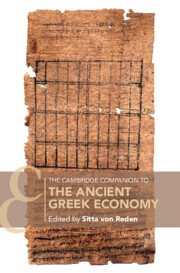Book contents
- The Cambridge Companion to the Ancient Greek Economy
- The Cambridge Companion to the Ancient Greek Economy
- Copyright page
- Contents
- Maps
- Notes on the Contributors
- Abbreviations
- Maps
- 1 Introduction
- Part I Diachronic Perspectives
- 2 Early Iron Age Economies
- 3 The Archaic Period
- 4 The Classical Period
- 5 Hellenistic Economies
- Part II Regional Perspectives
- Part III Structures and Processes
- Part IV Networks
- Part V Performance
- References
- Index
- Cambridge Companions to the Ancient World
5 - Hellenistic Economies
from Part I - Diachronic Perspectives
Published online by Cambridge University Press: 21 July 2022
- The Cambridge Companion to the Ancient Greek Economy
- The Cambridge Companion to the Ancient Greek Economy
- Copyright page
- Contents
- Maps
- Notes on the Contributors
- Abbreviations
- Maps
- 1 Introduction
- Part I Diachronic Perspectives
- 2 Early Iron Age Economies
- 3 The Archaic Period
- 4 The Classical Period
- 5 Hellenistic Economies
- Part II Regional Perspectives
- Part III Structures and Processes
- Part IV Networks
- Part V Performance
- References
- Index
- Cambridge Companions to the Ancient World
Summary
The conquest of Egypt and Asia, leading to new urban and fiscal infrastructures and new forms and levels of elite consumption, increased the scale of trade and exchange in the Hellenistic economy. Complex institutional changes that were spurred by both fiscal-military demand and local responses to this demand changed agrarian and commercial patterns, with likely positive effects on local markets. This chapter argues that the Hellenistic period was one of moderate economic growth both in the Greek poleis of the Aegean and in the core regions of Hellenistic Asia and Egypt. The greater presence of Roman traders in the Hellenistic East from the second century onwards is also likely to have had positive effects on market exchange and monetary circulation. Yet there is reason to assume that in the final decades of the Hellenistic period, all Hellenistic regions to some extent, but particularly the Aegean and Asia Minor, suffered from the destructive forces of the Roman military presence and subsequent tributary exploitation. Only after the Roman civil wars came to an end and fiscal practices were better regulated did the economies of the East begin to recover and to expand along the pathways that had developed in the Hellenistic period.
Keywords
- Type
- Chapter
- Information
- The Cambridge Companion to the Ancient Greek Economy , pp. 61 - 74Publisher: Cambridge University PressPrint publication year: 2022

